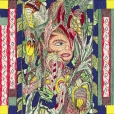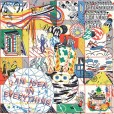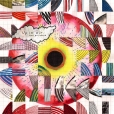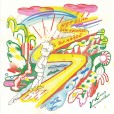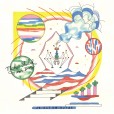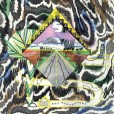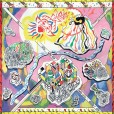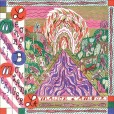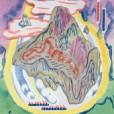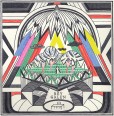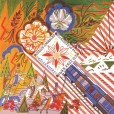Your basket is empty

Tartine De Clous
Compter Les Dents
Okraïna
A singing trio from Charente-Maritime, reviving folk songs from the neighbouring department of Vendée, on France’s western seaboard. Mostly recorded at home, with guests playing accordion, violin, piccolo and contrabassoon, and cigar-box guitar.
In his liner notes, old admirer and collaborator Alasdair Roberts registers ‘a deepened richness’ in these new recordings, ‘unfolding with a patient confidence… considered and poised.’
‘There’s a greater complexity and subtlety to their unique three-part harmonising, too. Their voices mesh in even stronger — almost telepathic — ‘fraternité’ than ever before: now commanding and mighty as a full-rigged counter-vessel, now gentle and lulling as a mother’s cradle-croon, or a whisper in a lover’s ear.’
‘Who would attempt to combine cunning ethnological forgery, Scottish folk songs, claw-hammer guitar, untutored horn-tootling, elastically relaxed drumming and garage electronic fuckery? Only Greg and Stefan, high on sea, sunshine and mis-judged micro-dosing — that’s who.
‘Don’t Drown was offered as practical advice during the self-described Yellow Submarine phase of making this record. And while they managed to avoid literally doing so (phew), they sound here like they got pretty ‘deep in’ to an Octopus’s sound world all their own. This surprisingly clear analogue recording has just enough Bikini Bottom grit to ensure traction. The tunes are inviting, and the sonic disruptions are too good-natured and goofy to upset even the most delicate digestion.
‘The sessions have had a couple of years to marinate, courtesy of some pandemic, and are here offered in that most Archducal of vinyl formats, the double ten inch. What are you waiting for, a side of Crabby Patties? Get your water-wings and dive in (unless you’re tripping)!’ (Bruce Russell, The Dead C)
Improvisations between Greenberger reading texts from his massive archive of old people’s testimony, Jones playing banjo and guitar, Corsano on drums.
‘Despite the dark and sad feeling of some of the texts (dealing with aging, memory loss etc), there is also humor, joy and grit. The album is a rollercoaster of emotions, a glittering patchwork of sonic atmospheres and an oral encyclopedia on dozens of subjects, like coffee, cigarettes, planets, art ... life ... and death.’
Linus plays the hommel, a forerunner of the Appalachian dulcimer, flutes and rattles; and sings.
‘The hommel has existed since the middle ages, but the earliest example still intact is from 1608. Once a staple in most households in the Low Countries, it is a true folk instrument, of the people, mainly played in the past by women who used their kitchen tables as resonating surfaces to amplify & accompany traditional religious & secular tunes. Nowadays it is seen rarely outside of museums in Brussels & other places you most likely have never heard of. It is not spectacular, its simplest version is just a long thin box with strings on top. Some of the strings are melody strings, which have frets placed underneath them, the others are drone strings that have no frets. Traditionally it was strummed with a goose feather & notes were made by sliding a hard stick with a handle, from fret to fret on the melody strings leaving the drone strings ringing openly. The constant hum of the drones is where the name of the instrument comes from: in Flemish, a bumblebee is a hommel.’
Lovely stuff from the wonderful Okraina.
‘Not a Best Of, but a reflection of Tori Kudo’s evolution as a composer, from playing with seasoned musicians, to playing with people just starting out, from playing with meticulous scores, to playing call & response melodies written down, to the songs here — instant improvisations based on keyboard compositions that Tori plays for the group. Yes, that is it. He plays a recording of himself on the keyboard, with singing or humming sometimes and he leaves it to the band to interpret this on the spot. Sometimes, you can make out the melody, other times it is quite obscure, as if a sort of common shyness flows out of the collected instrumentarium. And other times, well, it is a big party.’
A droning, slo-mo Leonard Cohen cover, and a collaboration with violinist Jessica Moss, from A Silver Mt. Zion; both around twelve minutes. Grouper’s a big fan.
Seven songs by Rully Shabara and Wukir Suryadi, rootsily mystical and vividly al fresco, spiralling from peripheral sites beside rubbish dumps and rice fields, into a busy market at the heart of Yogyakarta, from dawn till dusk.
Gorgeous, restorative duets by a French singer and Iranian singer/instrumentalist, taking a highly personal, affective approach to the traditional radif repertoire established by Ostad Abdollah Davami. Ecstatic, sensual ghazals from the thirteenth and fourteenth centuries: ‘You gave me away free,’ she chides. ‘I wouldn’t take the world for a single hair from your head.’
Two sides triumphantly add organ and harmonium, bendir and n’goni.
The performances are considered and expert enough, but with a have-a-go freshness and emotional truth, without snoot or prettification.
Wonderful artwork by Gwénola Carrère.
A magical record.
‘As always, there is a true touch of otherness to Delphine’s voice and approach. While most of the melodies are homespun, there is an abiding oddness to the electronic squiggles, keyboard swathes and found sounds that sit behind everything. At times it sounds as though she’s reciting nursery rhymes from another planet… and there’s an lazy jazziness to Mocke’s guitar playing that sets everything off quite beautifully’ (The Wire).
Ed Sanders founded a magazine called Fuck You (in 1962), a radical bookshop on the Lower East Side of NYC, named Peace Eye, and The Fugs.
This is a kind of incantatory left-anarchist history lesson, with interjections on a small keyboard called a pulse lyre, which he invented and built himself. It’s droll, epic, engaging, stirring; warmly recommended.
Presented in a beautiful gatefold sleeve, with lyric sheet.
‘Many mayhemic forces were set against the socialist zone…’

